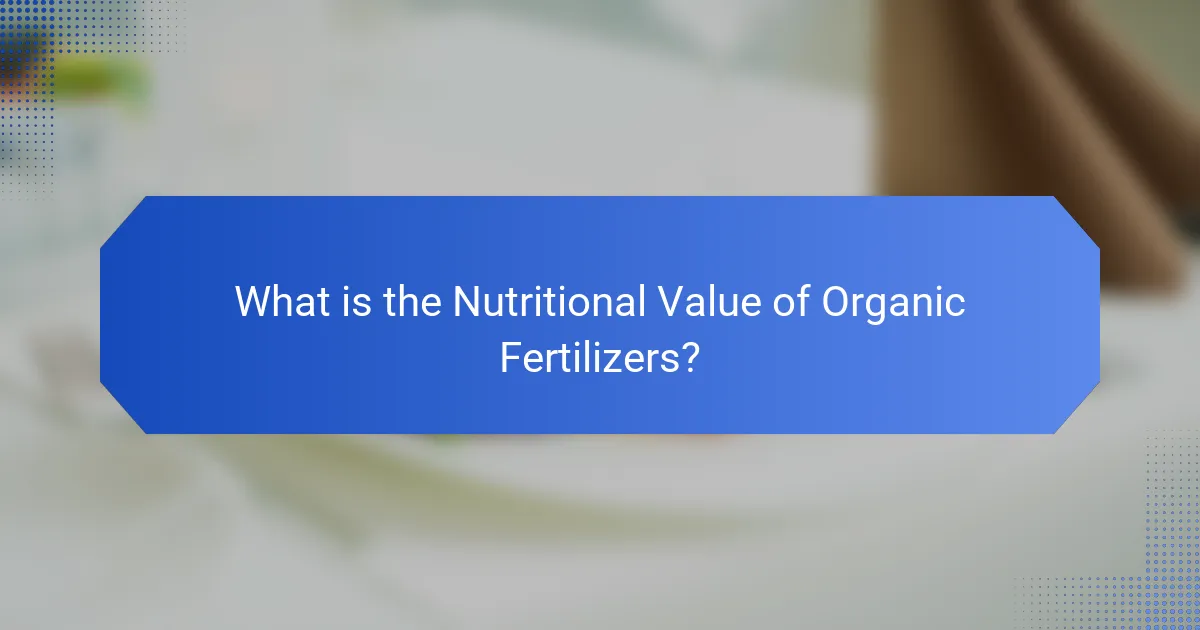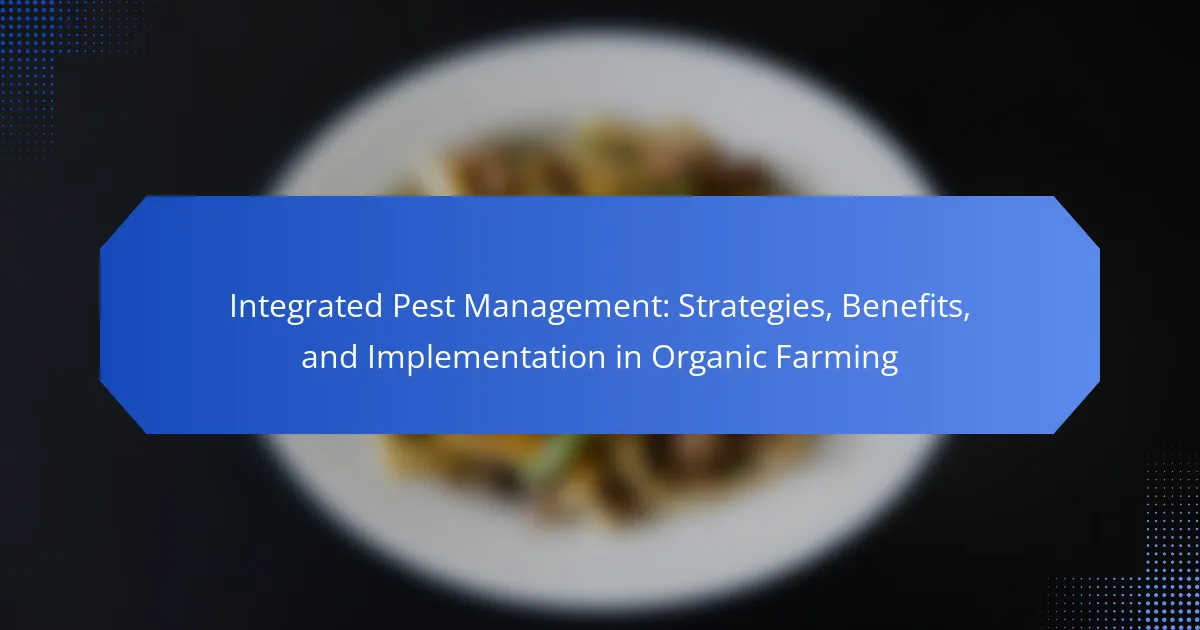Organic fertilizers are natural substances derived from plant, animal, or mineral sources that enhance soil fertility and promote plant growth. Common types include animal-based fertilizers like manure and bone meal, plant-based fertilizers such as compost and seaweed, and mineral-based fertilizers like rock phosphate. These fertilizers provide essential nutrients, including nitrogen, phosphorus, and potassium, while improving soil structure and microbial activity. Application methods for organic fertilizers encompass broadcasting, side dressing, and incorporation into the soil, each tailored to optimize nutrient availability based on crop type and soil conditions. Research indicates that organic fertilizers contribute to sustainable agriculture by increasing crop yields and enhancing soil health over time.

What are Organic Fertilizers?
Organic fertilizers are natural substances used to enhance soil fertility and plant growth. They are derived from plant, animal, or mineral sources. Common examples include compost, manure, and bone meal. Organic fertilizers improve soil structure and promote microbial activity. They release nutrients slowly, providing a steady supply to plants. Studies show that organic fertilizers can increase crop yields sustainably. According to the USDA, organic farming practices improve soil health and reduce chemical runoff.
How do Organic Fertilizers differ from Chemical Fertilizers?
Organic fertilizers are derived from natural sources, while chemical fertilizers are synthesized from inorganic compounds. Organic fertilizers improve soil health and enhance microbial activity. They release nutrients slowly, providing a steady supply over time. Chemical fertilizers deliver nutrients quickly but can lead to soil degradation. Organic options include compost, manure, and bone meal. Chemical fertilizers often contain nitrogen, phosphorus, and potassium in concentrated forms. Organic fertilizers promote sustainable agriculture practices, while chemical fertilizers can cause environmental harm. Studies show that organic fertilizers increase soil organic matter, improving long-term fertility.
What are the key characteristics of Organic Fertilizers?
Organic fertilizers are derived from natural sources and enhance soil fertility. They contain essential nutrients, including nitrogen, phosphorus, and potassium. Organic fertilizers improve soil structure and promote beneficial microbial activity. They release nutrients slowly, reducing the risk of leaching. These fertilizers are often made from compost, manure, or plant materials. They support sustainable agriculture practices by minimizing chemical inputs. Organic fertilizers can enhance water retention in soil, promoting healthier plant growth. Studies show that organic fertilizers can improve crop yield and quality over time.
Why is sustainability important in the use of Organic Fertilizers?
Sustainability is crucial in the use of organic fertilizers because it promotes long-term agricultural health. Organic fertilizers enhance soil fertility without depleting natural resources. They improve soil structure and biodiversity. This leads to increased crop yields over time. Sustainable practices reduce reliance on synthetic chemicals. They minimize environmental pollution and preserve ecosystems. Research shows that organic fertilizers can enhance carbon sequestration in soils. This contributes to climate change mitigation, making sustainability vital for future food security.
What are the main benefits of using Organic Fertilizers?
Organic fertilizers enhance soil health and promote sustainable agriculture. They improve soil structure and increase microbial activity. This leads to better nutrient retention and water absorption. Organic fertilizers also reduce chemical runoff, protecting local waterways. They provide a slow release of nutrients, ensuring plants receive them over time. Studies show that organic practices can yield comparable results to conventional methods. For example, a study published in the Journal of Organic Agriculture found that organic fertilizers can improve crop yield by 20%. Additionally, they contribute to biodiversity in the soil ecosystem.
How do Organic Fertilizers improve soil health?
Organic fertilizers improve soil health by enhancing its structure, fertility, and microbial activity. They increase the organic matter content in the soil. This organic matter helps retain moisture and nutrients. Microbial activity is stimulated by the nutrients in organic fertilizers. Beneficial microorganisms break down organic matter, releasing essential nutrients. This process improves nutrient availability to plants. Studies show that soils treated with organic fertilizers have higher biodiversity. Enhanced biodiversity leads to better soil resilience and productivity.
What role do Organic Fertilizers play in plant growth?
Organic fertilizers enhance plant growth by providing essential nutrients and improving soil health. They release nutrients slowly, ensuring a steady supply for plants. Organic fertilizers contain macronutrients like nitrogen, phosphorus, and potassium. These nutrients support critical processes such as photosynthesis and root development. Additionally, organic fertilizers improve soil structure and increase microbial activity. This leads to better water retention and nutrient availability. Studies show that using organic fertilizers can increase crop yields significantly. For instance, research by the Food and Agriculture Organization indicates that organic practices can boost yields by up to 30%.

What are the Types of Organic Fertilizers?
The types of organic fertilizers include animal-based, plant-based, and mineral-based fertilizers. Animal-based fertilizers consist of manure and bone meal. Plant-based fertilizers are derived from compost, green manure, and seaweed. Mineral-based fertilizers include rock phosphate and greensand. Each type provides essential nutrients to plants. For instance, manure enriches soil with nitrogen, while compost improves soil structure. Studies show that organic fertilizers enhance soil health and promote sustainable agriculture.
What are the different categories of Organic Fertilizers?
Organic fertilizers can be categorized into several types. The main categories include animal-based fertilizers, plant-based fertilizers, and mineral-based fertilizers. Animal-based fertilizers include manure, bone meal, and fish emulsion. Plant-based fertilizers consist of compost, green manure, and seaweed extracts. Mineral-based fertilizers are derived from naturally occurring minerals and include rock phosphate and greensand. Each category provides essential nutrients for plant growth and improves soil health.
What are the characteristics of Animal-Based Organic Fertilizers?
Animal-based organic fertilizers are derived from animal by-products. They typically contain high levels of nitrogen, phosphorus, and potassium. These nutrients are essential for plant growth. Animal-based fertilizers also improve soil structure and water retention. They promote beneficial microbial activity in the soil. Common forms include manure, bone meal, and fish emulsion. The nutrient release from these fertilizers is gradual, providing sustained feeding for plants. Additionally, they can enhance soil fertility over time through organic matter addition.
What are the benefits of Plant-Based Organic Fertilizers?
Plant-based organic fertilizers enhance soil health and promote sustainable agriculture. They improve soil structure and increase its ability to retain moisture. These fertilizers provide essential nutrients like nitrogen, phosphorus, and potassium, which are vital for plant growth. They also encourage beneficial microbial activity in the soil.
Research indicates that plant-based fertilizers can reduce the need for chemical fertilizers. A study published in the Journal of Cleaner Production found that organic fertilizers can lead to higher crop yields over time. Additionally, they are environmentally friendly and contribute to reducing carbon footprints.
How can Organic Fertilizers be classified based on their source?
Organic fertilizers can be classified based on their source into two main categories: plant-based and animal-based. Plant-based organic fertilizers derive from plant materials, such as compost, green manure, and seaweed. They provide essential nutrients and improve soil structure. Animal-based organic fertilizers come from animal by-products, including manure, bone meal, and fish emulsion. These fertilizers are rich in nitrogen and other nutrients. Both categories enhance soil fertility and promote healthy plant growth. Their classification helps in selecting the appropriate fertilizer for specific agricultural needs.
What are the common sources of Organic Fertilizers?
Common sources of organic fertilizers include animal manure, compost, green manure, and bone meal. Animal manure is rich in nutrients and widely used in agriculture. Compost is created from decomposed organic matter and improves soil structure. Green manure consists of cover crops that are tilled back into the soil. Bone meal provides phosphorus and calcium, promoting root development. These sources contribute essential nutrients for plant growth and enhance soil fertility.
Which Organic Fertilizers are derived from compost?
Organic fertilizers derived from compost include compost tea, worm castings, and finished compost itself. Compost tea is a liquid extract made by steeping compost in water. This process enriches the water with nutrients and beneficial microorganisms. Worm castings are produced by earthworms as they break down organic matter. They are rich in nutrients and improve soil structure. Finished compost is the result of the decomposition of organic materials. It provides a balanced nutrient supply and enhances soil fertility. These organic fertilizers enhance plant growth and soil health.

What is the Nutritional Value of Organic Fertilizers?
Organic fertilizers provide essential nutrients for plant growth. They typically contain nitrogen, phosphorus, and potassium, known as NPK. Organic fertilizers also include micronutrients like calcium, magnesium, and sulfur. These nutrients are vital for various plant functions. For example, nitrogen supports leaf growth, phosphorus promotes root development, and potassium enhances overall plant health. Organic fertilizers release nutrients slowly, improving soil structure and microbial activity. This slow release reduces the risk of nutrient leaching compared to synthetic fertilizers. Studies show that organic fertilizers can enhance soil fertility and crop yield over time.
How do Organic Fertilizers provide essential nutrients to plants?
Organic fertilizers provide essential nutrients to plants through natural decomposition processes. They contain a variety of nutrients, including nitrogen, phosphorus, and potassium. These nutrients are released slowly as organic matter breaks down in the soil. Microorganisms play a crucial role in this decomposition. They break down complex organic materials, making nutrients available to plants. Additionally, organic fertilizers improve soil structure and enhance water retention. Studies show that organic fertilizers can increase crop yields by improving soil health. This process supports sustainable agriculture and reduces reliance on synthetic fertilizers.
What macronutrients are found in Organic Fertilizers?
Organic fertilizers primarily contain three macronutrients: nitrogen, phosphorus, and potassium. Nitrogen supports plant growth and leaf development. Phosphorus promotes root development and flowering. Potassium enhances overall plant health and disease resistance. These macronutrients are essential for plant growth and are commonly found in various organic materials such as manure, compost, and bone meal. Their presence in organic fertilizers contributes to soil fertility and sustainable agriculture practices.
What micronutrients are essential for plant health from Organic Fertilizers?
Essential micronutrients for plant health from organic fertilizers include iron, manganese, zinc, copper, molybdenum, and boron. These micronutrients play critical roles in various plant functions. Iron is vital for chlorophyll synthesis and photosynthesis. Manganese assists in enzyme function and photosynthesis. Zinc is necessary for growth hormone production and enzyme activity. Copper is involved in photosynthesis and respiration processes. Molybdenum aids in nitrogen fixation and enzyme function. Boron contributes to cell wall formation and reproductive development. Organic fertilizers often provide these micronutrients in a bioavailable form, enhancing plant health and growth.
Why is the nutrient composition of Organic Fertilizers important?
The nutrient composition of organic fertilizers is important because it directly affects plant growth and soil health. Organic fertilizers provide essential nutrients such as nitrogen, phosphorus, and potassium. Each nutrient plays a specific role in plant development. For example, nitrogen promotes leaf growth, phosphorus supports root and flower development, and potassium enhances overall plant resilience. Balanced nutrient composition leads to improved crop yields. Studies show that organic fertilizers can enhance soil fertility over time. They also contribute to microbial activity, which is vital for nutrient cycling. A well-composed organic fertilizer can reduce the need for synthetic fertilizers, promoting sustainable agriculture.
How does nutrient availability affect plant growth?
Nutrient availability significantly affects plant growth. Plants require essential nutrients for various physiological processes. Macronutrients like nitrogen, phosphorus, and potassium are critical for growth and development. Nitrogen promotes leaf and stem growth. Phosphorus supports root development and flowering. Potassium enhances overall plant health and resistance to diseases.
When nutrients are deficient, plants exhibit stunted growth and poor yields. A study published in the Journal of Plant Nutrition found that nitrogen deficiency can reduce crop yields by up to 50%. Conversely, adequate nutrient availability leads to robust plant growth and increased productivity. Thus, managing nutrient supply is vital for optimal plant health.
What factors influence the nutrient release from Organic Fertilizers?
The nutrient release from organic fertilizers is influenced by several key factors. These factors include the composition of the organic material, microbial activity, temperature, moisture levels, and the carbon-to-nitrogen (C:N) ratio. The composition affects nutrient availability; for example, manure has different nutrient profiles compared to compost. Microbial activity plays a crucial role in breaking down organic matter, which releases nutrients. Higher temperatures typically enhance microbial processes, increasing nutrient release rates. Adequate moisture is essential for microbial survival and activity, facilitating nutrient mobilization. The C:N ratio influences decomposition speed; a lower ratio often leads to faster nutrient release. Together, these factors determine how effectively organic fertilizers provide nutrients to plants.

What are the Application Methods for Organic Fertilizers?
The application methods for organic fertilizers include broadcasting, side dressing, and incorporation into the soil. Broadcasting involves spreading the fertilizer evenly across the soil surface. This method is often used for granular organic fertilizers. Side dressing entails applying the fertilizer in bands alongside growing plants. This method provides nutrients directly to the root zone. Incorporation into the soil involves mixing the fertilizer with the soil before planting. This method ensures that nutrients are readily available to plants as they grow. Each method has its specific advantages depending on crop type and soil conditions.
How should Organic Fertilizers be applied for maximum effectiveness?
Organic fertilizers should be applied according to specific methods for maximum effectiveness. First, they should be evenly distributed across the soil surface. This ensures that nutrients are accessible to plant roots. Incorporating the fertilizer into the top few inches of soil enhances nutrient absorption. Watering the area after application helps activate the fertilizer. Timing is also crucial; applying organic fertilizers during the growing season maximizes their benefits. Additionally, following recommended application rates prevents nutrient runoff and soil depletion. Research indicates that applying organic fertilizers in conjunction with soil testing leads to better crop yields.
What are the best practices for applying Organic Fertilizers?
The best practices for applying organic fertilizers include understanding soil health, timing, and application methods. First, test the soil to determine nutrient needs. This helps in selecting the right type of organic fertilizer. Apply fertilizers during the growing season for maximum effectiveness. Incorporate fertilizers into the soil to enhance nutrient availability. Use compost or well-rotted manure as they provide a balanced nutrient profile. Avoid over-application to prevent nutrient runoff and environmental harm. Water the soil after application to aid nutrient absorption. Following these practices ensures optimal plant growth and soil health.
How can timing affect the application of Organic Fertilizers?
Timing significantly affects the application of organic fertilizers. Applying organic fertilizers at the right time maximizes nutrient availability for plants. Early application can enhance soil fertility before planting. This ensures nutrients are readily available during critical growth stages. Conversely, late application may lead to nutrient loss through leaching. Seasonal timing also influences microbial activity, which helps in nutrient breakdown. For example, warmer temperatures increase microbial activity, enhancing nutrient release. Therefore, aligning fertilizer application with plant growth cycles is essential for optimal results.
What are the common challenges in applying Organic Fertilizers?
Common challenges in applying organic fertilizers include nutrient variability, slow nutrient release, and potential pathogens. Nutrient variability refers to the inconsistency in nutrient content across different organic materials. This can lead to imbalanced soil nutrition. Slow nutrient release means that organic fertilizers often provide nutrients gradually, which may not meet immediate plant needs. Additionally, some organic fertilizers may contain pathogens, which can pose risks to plant health and soil microorganisms. These challenges can complicate effective application and management in agricultural practices.
How can improper application affect plant health?
Improper application of organic fertilizers can significantly harm plant health. Over-application can lead to nutrient burn, damaging plant roots and foliage. This can result in stunted growth or even plant death. Under-application may deprive plants of essential nutrients, leading to deficiencies. Deficiencies can manifest as yellowing leaves or poor fruit development. Incorrect timing of application can disrupt plant nutrient uptake, affecting overall health. Soil pH imbalances from improper application can inhibit nutrient absorption. Studies show that balanced application methods improve plant resilience and yield. Proper application techniques are crucial for maintaining optimal plant health.
What are the signs of over-application of Organic Fertilizers?
Signs of over-application of organic fertilizers include nutrient burn, which manifests as browning or wilting of plant leaves. Excessive growth can occur, leading to weak stems and increased susceptibility to pests. Soil nutrient imbalance may result, causing deficiencies in essential elements. Unpleasant odors may arise from decomposing organic matter. Weeds can proliferate due to the high nutrient levels. Additionally, water retention issues may develop, leading to poor drainage and root rot. These signs indicate that the application of organic fertilizers exceeds the plants’ needs.
What tips can enhance the use of Organic Fertilizers in gardening?
To enhance the use of organic fertilizers in gardening, consider applying them at the right time. Timing improves nutrient absorption. Use organic fertilizers during the growing season for optimal plant growth. Incorporate the fertilizers into the soil to increase effectiveness. This practice promotes better nutrient availability. Water the plants after application to help fertilizers dissolve and activate. Regularly test soil to determine nutrient needs. Adjust fertilizer types based on specific plant requirements. Rotate crops to prevent nutrient depletion and enhance soil health. These practices ensure that organic fertilizers provide maximum benefits to plants.
Organic fertilizers are natural substances derived from plant, animal, or mineral sources that enhance soil fertility and promote plant growth. This article covers the types of organic fertilizers, including animal-based, plant-based, and mineral-based options, as well as their nutritional value, which includes essential macronutrients and micronutrients. It also discusses application methods, best practices for effective use, and the importance of sustainability in organic fertilizer practices. Key benefits of organic fertilizers, such as improved soil health, reduced chemical runoff, and enhanced crop yields, are highlighted throughout the article.



